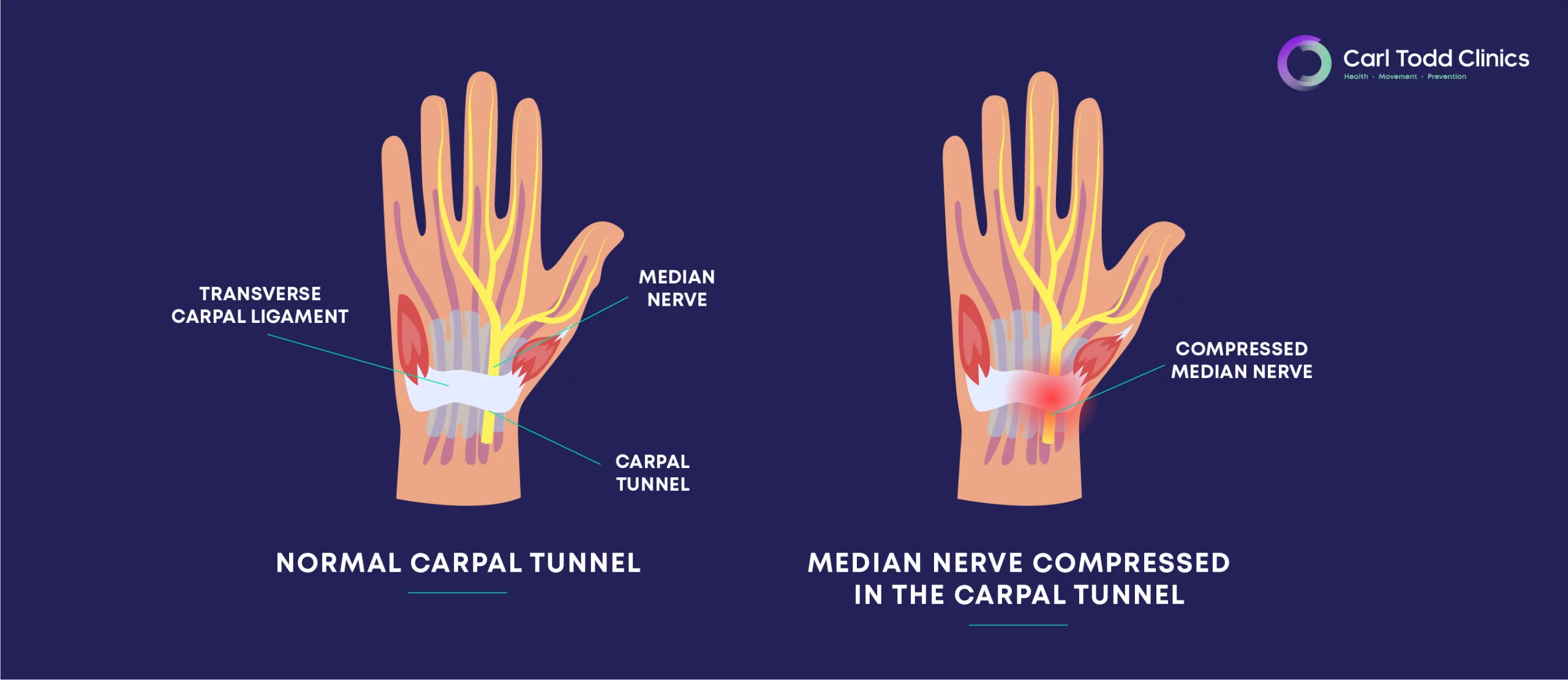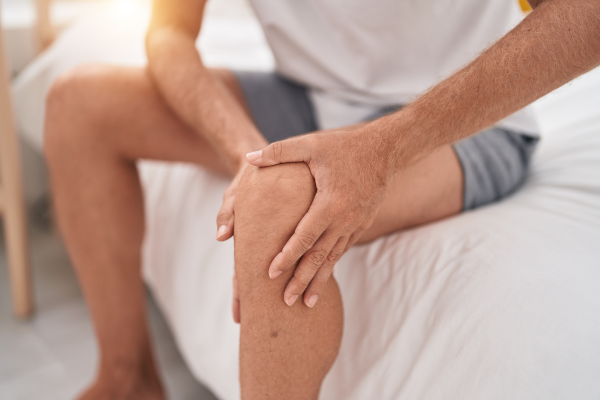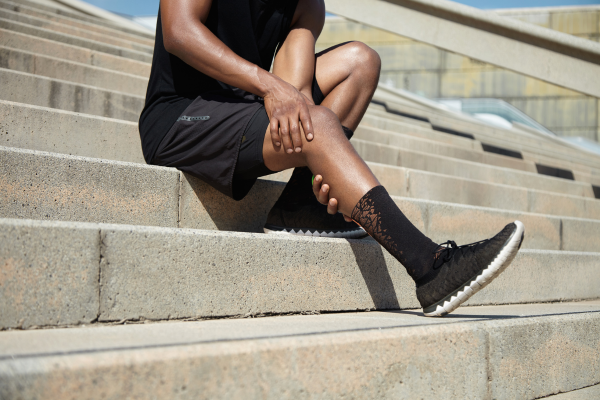Carpal tunnel syndrome affects around 4-5% of people worldwide and can pose many challenges; simple things such as struggling to hold a cup of coffee or button up a shirt. It’s most commonly found in women and those over the age of 50, but can affect people of all ages.
This article will explore what carpal tunnel syndrome is, the symptoms, what makes it worse and how osteopathy can help.
What is carpal tunnel syndrome?
Carpal tunnel syndrome (CTS) is a condition that causes pain, tingling and numbness in your hands and fingers. This happens when the median nerve gets squeezed or compressed as it passes through the eight bones in your wrist called the carpal tunnel.
The median nerve allows you to feel sensations in your middle finger, index finger and thumb as well as providing feeling to part of your ring finger. The compression that occurs can happen from repetitive hand movements, swelling or other health conditions.

Carpal tunnel syndrome symptoms
CTS can start off mildly but will continue to worsen over a long period of time if left untreated, which is why it’s important to know the signs and how to relieve them to prevent permanent damage. As the condition worsens, symptoms may include:
- Weakness in your hand making it difficult to write or fasten buttons.
- A weak thumb or difficulty gripping objects where you may find yourself frequently dropping things.
- Tingling, numbness or pins and needles in the affected hand, forearm and/or the upper arm.
These symptoms can get in the way of daily tasks and usually become worse at night, causing sleep disturbance. Holding the affected hand in the air, dangling it out of bed or shaking it can provide short-term relief to reduce pain and tingling, but you should reach out to a healthcare professional for proper treatment.
The causes of carpal tunnel syndrome
The median nerve is sensitive to pressure; there are a few causes and conditions such as pregnancy, arthritis and diabetes that can make this pressure worse and lead to carpal tunnel syndrome. During pregnancy swelling can occur, and for some pregnant women, this swelling can take place in the wrists. In fact around 31% to 62% of pregnant women experience carpal tunnel syndrome as the blood volume doubles and extra pressure is put on the carpal tunnel area.
Any kind of arthritis in the wrist can lead to a higher risk of developing carpal tunnel syndrome due to the nerves already being inflamed. With diabetes, research suggests that the link between the condition and carpal tunnel syndrome could be due to excessively high blood sugar levels. This can lead to the tendons in the carpal tunnel becoming glycosylated, a process where glucose attaches to the tendon proteins and restricts their ability to move freely, contributing to carpal tunnel syndrome.
What makes carpal tunnel worse?
It’s important to know which habits could be making the condition worse. These include:
Repetitive hand and wrist movements
Activities that need you to perform repetitive hand movements such as texting, using a computer mouse, knitting, sewing, and painting can all contribute to the worsening of carpal tunnel syndrome. Not taking a break from these activities can cause inflammation to worsen in your wrist which will ultimately put more pressure on your median nerve.
Find out more about Repetitive strain injury (RSI): Diagnosis, symptoms, and treatment
Poor posture
Slouching or poor posture puts pressure on the muscles in your shoulders and neck, leading to nerve compression in your arm and causing carpal tunnel syndrome to worsen. To correct slouching, be mindful of how you sit when at a desk or on low-seated sofas, keep a straight back and spend some time doing simple stretching exercises to improve posture.
Find out more about How osteopathy improves posture
Incorrect keyboard position
To reduce the amount of strain on your wrist when typing, make sure your keyboard is sat just above your lap and that your wrists are at a neutral angle. If your wrists are bent too far up or down pressure is put on the median nerve causing carpal tunnel syndrome.
Holding on to objects too tightly
Repetitively gripping tools or objects too tightly can put excessive strain on the nerves in your hand. Over a long period of time this can make your carpal tunnel condition much worse. Loosen your grip on tools, instruments or your phone and lightly type when at a keyboard.
How osteopathy can help carpal tunnel syndrome
When the symptoms of carpal tunnel syndrome become worse and affect your quality of life it’s important to seek treatment. Osteopathy can help improve blood flow to the wrists, stimulate the body’s natural healing mechanisms, and also improve the nervous and lymphatic systems.
Osteopathic techniques will focus on taking pressure off of the median nerve to improve wrist functionality and range of motion, while also reducing pain and swelling. By improving circulation within the wrist, blood flow can also be better stimulated and healing to the tissue and nerves of the wrist and hands. It’s important to have osteopathic treatments regularly for manipulation and mobilising techniques.
After a single session, you should find symptoms improved, however it’s important to continue on a treatment plan as it will greatly benefit you in the long run!
Given the range of symptoms associated with carpal tunnel syndrome, an individualised approach to treatment, such as osteopathy, can be particularly beneficial for managing this condition. If you suspect you have carpal tunnel syndrome contact our team or book an appointment.





